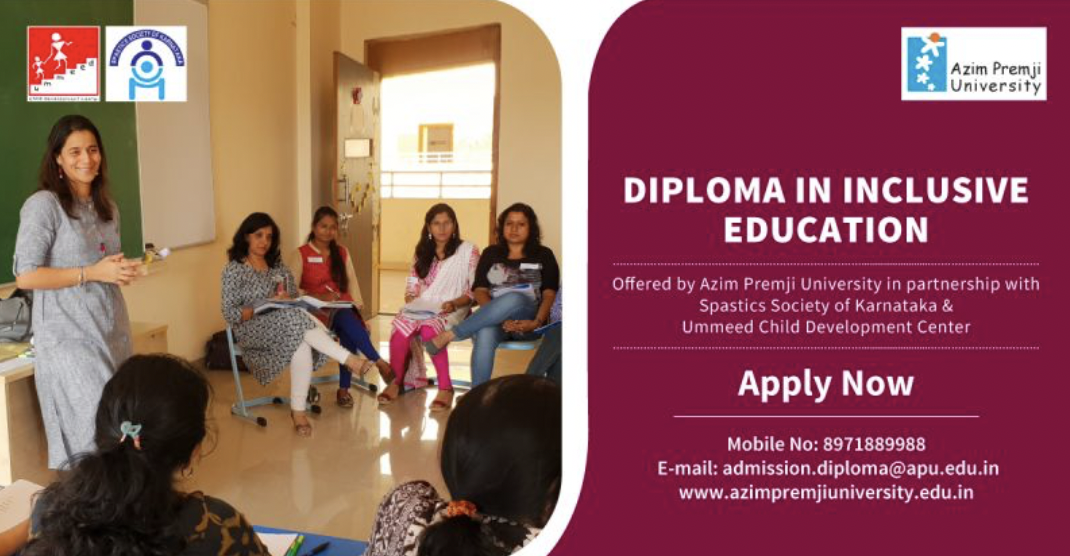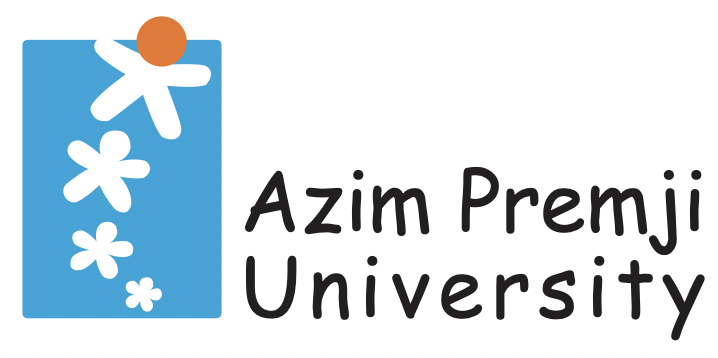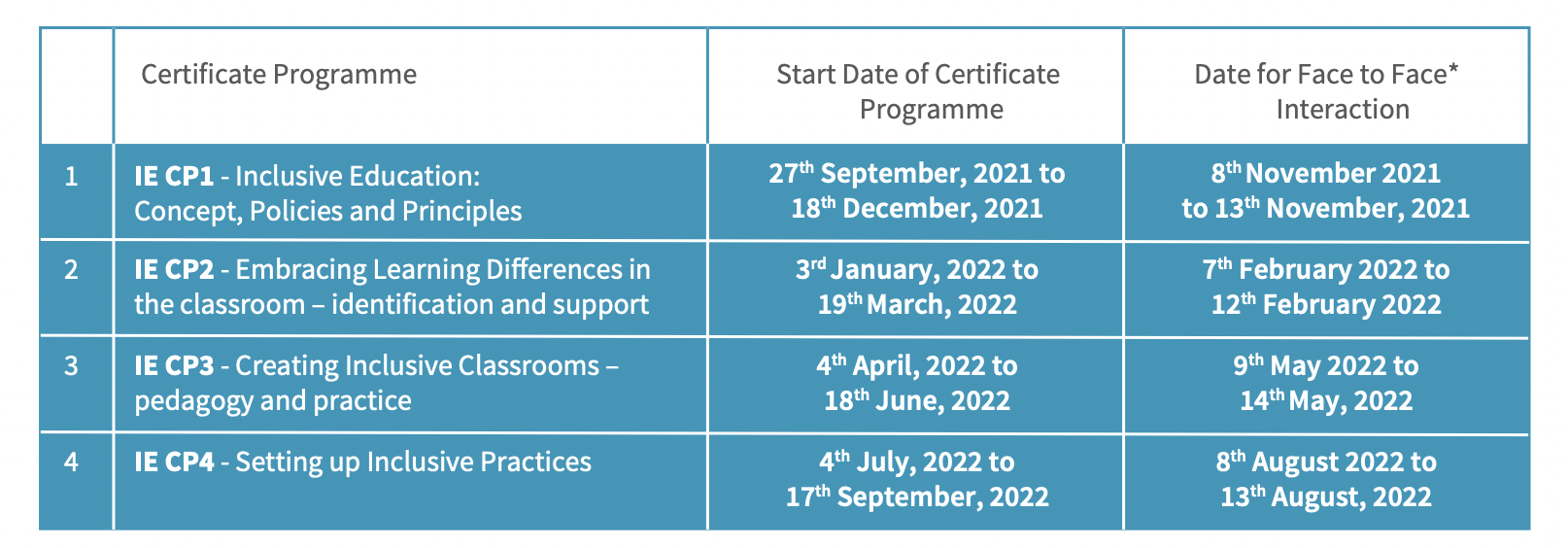Diploma in Inclusive Education

![]()

Azim Premji University was founded in 2010, with the vision to contribute to the realisation of a just, equitable, humane and sustainable society. We now have postgraduate degrees in Education, Development, Public Policy & Governance, Economics and an LLM in Law and Development. We offer undergraduate degrees in social science (Economics), science (Mathematics, Physics and Biology) and the Humanities (Language and Literature, History, and Philosophy). We offer a dual degree in science and teacher education.
We conduct more than 150 short courses for professionals every year, in the fields of education, development, policy and governance across the country. We have conducted more than 1000workshops for working professionals – teachers, teacher educators, development professionals and researchers alike. Our students come from diverse social backgrounds and are supported through our efforts to make education accessible.
Over 2300 graduates from our programmes have gone on to create gradual but impactful change in the social sector. Our faculty create and teach challenging and reflective curricula for the classroom, research and field practice. Our Research Centre brings together individuals from across the University, and collaborates with other institutions in interdisciplinary teams. We address critical questions about India’s futures.
The vision of Azim Premji Foundation is to contribute towards a just, equitable, humane and sustainable society, with a focus on India.
Azim Premji began his systematic philanthropic activities in 2001. Over the past years, he has transferred a significant part of his personal wealth, including the economic ownership of about 74 per cent of Wipro’s shareholding, for philanthropic purposes. He has irrevocably donated and created an endowment currently valued at approximately USD 35 billion (INR 262,000 crores) to fund work (mentioned below). Azim Premji Foundation (‘the Foundation’) continues to have 67 per cent of the economic ownership of Wipro.
The work of the Foundation spans from education to other important areas of equity and human well-being. In education, the Foundation has its own operations. In the other fields, it supports a large number of not-for-profits through multi-year financial grants.
Working with children with diverse learning needs in the classroom | Duration : 1 year part-time
There are children with different learning needs in every classroom. Studies show that children with disabilities who are educated in regular schools do better than those who attend special schools.
The National Education Policy (NEP) of India proposes that children with diverse learning needs should participate fully in the regular schooling process. Teachers in regular classrooms need to develop capabilities to cater to the diverse learning needs of children in their classrooms. An inclusive school environment benefits all children, not just those with disabilities.
What we offer
Our programme is designed for teachers and educators who work in the regular school system.
The purpose of the diploma programme is to create knowledge and skills in teachers and educators to make their classrooms safe and inclusive for children with diverse learning needs.
Our 12-month programme to be offered in ‘blended’ mode comprises of online classes and in-person sessions. The Diploma programme includes four certificate programmes of twelve weeks duration each.
On successfully completing the programme, you will be awarded a diploma. Each certificate programme can also be taken individually, leading to the award of a certificate.
Our objectives
Our diploma aims to:
- Provide regular school teachers with an understanding about inclusion, current policy provisions, and the benefits and barriers of inclusive education in the Indian school system.
- Prepare teachers with skills to identify and support diversity in the classroom.
- Equip teachers with capabilities to modify the curriculum, instruction, pedagogy and assessment to support the needs of children with learning difficulties in regular classrooms.
- Provide teachers and educators with knowledge and skills to set up inclusive practices in their own contexts.
Offered in collaboration
This programme will be offered in collaboration with Spastics Society of Karnataka, and Ummeed Child Development Centre.
Spastics Society of Karnataka is a non-governmental organisation that has done 15 years and more of dedicated service towards conducting various pre-service and in-service teacher training programmes for inclusive education, autism spectrum disorder, learning disability, early childhood education, and cerebral palsy.
Ummeed Child Development Centre is a not-for-profit organisation with a vision of helping children with developmental disabilities reach their full potential to be included in society. In nineteen years, with a transdisciplinary team of developmental paediatricians, occupational therapists, mental health professionals, autism intervention specialists, special educators, speech therapists and social workers have directly worked with over 10,000 children and their families, providing support through over 75,000 sessions.
Who should join?
The diploma programme will be beneficial to all teachers in the primary and middle school, and to educators in administrative roles such as school heads, principals, special educators, and counsellors belonging to the public and private school systems.
We look for a proven interest in working with young children and/or relevant work experience of 2 years or more.
You can apply if:
- You have an undergraduate degree in any discipline (this is preferred)
- You have working knowledge of English (reading, writing, and speaking)
Application process and fees
Admission process
STEP 1 : Online application form with statement of purpose
STEP 2 : Personal Interview (conducted online)
Fees
Diploma Programme
The total fees are INR 35,400 (including GST)
Before commencement of first certificate programme: INR 17,700
Before commencement of third certificate programme: INR 17,700
CERTIFICATE PROGRAMME
The total fees are INR 10,030 (including GST)
Before the commencement of the programme: INR 10, 030* (including GST)
*No refund
Note: GST rates are in line with Government guidelines and are subject to change.
Course structure
The programme is structured as 4 Certificate programmes of 12 weeks duration leading up to the complete Diploma.
These 4 certificate programmes are –
Inclusive Education: Concept, Policies and Principles, Embracing Learning Differences in the Classroom – Identification and Support, Creating Inclusive Classrooms – Pedagogy and Practice, Setting up Inclusive Practices.
This diploma will provide regular school teachers with knowledge of inclusive education as a concept and practice, with the skills needed to identify and work with children with disabilities in regular classrooms.
Pedagogy
Through extensive hands-on exercises and evidence-based practices, teachers will learn how to modify curriculum, teaching practices and assessment to suit individual learning needs of children in their classrooms, and to practice inclusion in their own settings.
The programmes will be offered in blended mode.
Online
This includes synchronous and asynchronous interactions. In the direct interaction in the online mode, there will be lectures, group work, workshops, presentations for assessment and classroom discussions. Asynchronous interactions include the sharing of readings, participation in discussion forums, audio/video materials, and work on individual assignments.
Face to face interaction
This will be held in Bangalore. It will include six days of block teaching once during the 12 week period for each certificate programme. This includes direct lectures, workshops and supervision of practicum and field work.
Calendar: September 2021 to August 2022





